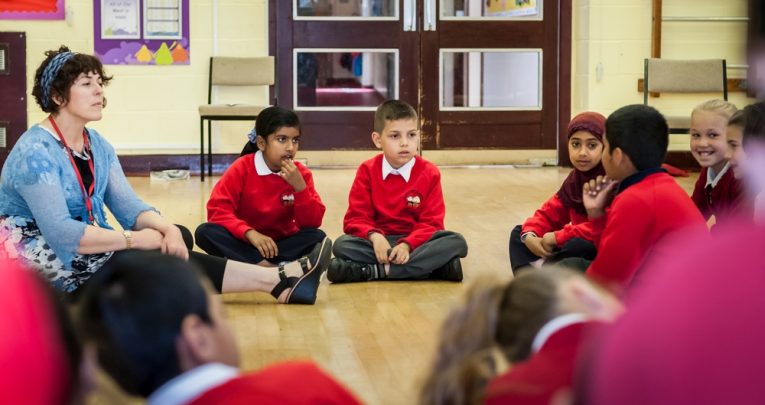“It’s Time To Make Children’s Voices Heard”

Speaking and listening is still undervalued by the National Curriculum. But as a seventh-month research project undertaken in Bedford’s schools shows, we neglect this skill at our peril, says Tony Wood…

- by Tony Wood

The moment she rose, the audience suspected they were in for something special. The chairman had been glowing in his introduction, listing some of her many achievements, but also hinting she had much more to offer. As the welcoming applause receded, she smiled, eyes scanning the room until all was silent, and then, in a clear and controlled voice, she began. “Ladies and gentlemen. Tonight I am going to explain why we should allow children to undertake paid work.” A wave of puzzlement rippled around the room.
With poise and eloquence, the speaker began to build her case. Children, she said, would then better understand the value of money and how people have to work hard to buy something they want; they would gain appreciation for their parents and understand that money does not grow on trees. And by becoming financially more aware, they would realise that saving money is an important life skill. As she continued to develop the argument, puzzled looks were replaced by nods of understanding, and when she finally concluded her presentation, the room erupted with applause. Questions followed thick and fast, but all were answered with clarity, wit and humour. When the chairman brought matters to a conclusion, she sat down to a volume of applause even greater than before. Her name was Sumayyah, the daughter of Somalian parents. She was just nine years old, and English was her second language.
Three years on…
Sumayyah is just one of over 3000 primary school children who have been involved in a pioneering speaking and listening project launched in 2011 in Bedford schools. Its original purpose was to challenge the downgrading of oracy in the National Curriculum by demonstrating that improving oral skills can produce very worthwhile effects in terms of motivation, commitment and achievement, and that adding appropriate speaking and listening activities to the curriculum need not require schools to sacrifice something else. The paucity of such skills amongst school leavers has been well documented and is frequently the source of complaints by employers. Recently the British Chambers of Commerce published a survey showing that 69% of employers thought schools were not effective at preparing young people for work, and most (88%) wanted better oracy more than anything else – ahead of numeracy and literacy. I suspect few would challenge the view that the teenage years are not the best times to lay foundations for many life skills. Efforts are likely to prove far more effective when children are much younger; when they are generally more receptive than teenagers and – dare I say it – eager to learn.
The rationale for giving a greater emphasis to developing good verbal skills in primary school children is surely self-evident. This was our thinking in 2011. We wanted to improve pupils’ command and use of English whilst also building up their self-confidence and personal esteem. In the October 2013 issue of Teach Primary, I argued that a change of direction was urgently needed in the government’s policy to downgrade speaking and listening activities in the national curriculum. I described briefly the launch of the Bedford project, and how we had set up a controlled research programme in parallel to establish whether or not engaging in such activities is reflected in a child’s school performance in a way we can measure. The results of the research were astonishing. They showed that the pupils who followed the speaking and listening activities, on average, made statistically highly significant gains in a nationally standardised test of non-verbal reasoning when compared with their peers, who were given different (but equally stimulating) enrichment activities. They also did better in achieving or exceeding their teachers’ key stage 2 forecasts.
These effects were particularly marked for children who were initially below the national average, for those for whom English was an additional language, and for boys. At the end of the seven-month project, the assessments achieved by many pupils in the speaking and listening groups were those normally expected from children between one and two years older. We have gathered powerful empirical evidence to justify the presence of speaking and listening activities in the curriculum, but nearly three years on from my original article, where do we now stand nationally, and how have the pioneering activities in Bedford developed?
Think Winston
On the national scene nothing much has changed. No surprise there, then! A ministerial re-think will only happen if there is sufficient pressure from the profession, and teachers generally are much too busy to be enthusiastic about placing yet more demands on a crowded curriculum. If they are to be persuaded, they also need to be convinced that new activities will be manageable as well as worthwhile.
So what have we contributed in this respect during the life of the project so far?
From the start, schools were provided with newly devised draft sets of graded speaking and listening activities, all cast in the form of lesson plans suitable for group and class work. Teachers were invited to try the activities and feed back their views and comments to enable improvements to be made.
Year on year the process continued, as new materials were developed and then revised. The network of schools involved expanded across the UK and contacts opened up overseas. From a starting point of delivering the lessons as stand-alone items, teachers soon realised that the principles and scenarios involved could be woven into different areas of the curriculum with little difficulty, to complement existing teaching methods and enhance and reinforce learning in those subjects.
In short, well-designed speaking and listening activities do not need to replace other curriculum sessions.
Great rewards
The rewards can be great. Most apparent is the way that children – especially the least forthcoming – can visibly grow in stature as they learn how to speak with confidence in front of others, and have to think on their feet when posing and answering questions. Perhaps surprisingly to some, there can also be very positive effects on pupils’ literacy and written work. Improved self-confidence can be a great morale booster. In 2015, the complete collection of tested lesson plans (together with full guidance on how to prepare, organise and run school public speaking and debating competitions) were grouped into four overlapping levels of difficulty to cover the age range 7-13, and published worldwide by Routledge as a 100-page resource book for schools. This year is the 50th anniversary of the death of Sir Winston Churchill – orator extraordinaire,and a former chairman of the English-Speaking Union. In one of his many memorable quotes he said “There is no finer investment for any community than putting milk into babies!” We may not be talking either milk or babies here, but the principle of nourishing the young to enable them to use and exploit the beauty of Winston’s beloved English language, would have been something close to his heart. So in this anniversary year, why not resolve to celebrate his life and words by giving your young charges a head start to mastering use of the English language? One day they will thank you for it, and the Sumayyahs in your school will be given the chance to make their voices heard.
Join the conversation
Why not try these three of the activities from the project, all available in Teachwire’s resources section?
1. The leaky balloon The airship is sinking. Who do pupils throw off first?
2. Changing our school Who can win the debate of how to make the school a better place?
3. Good cop, bad cop Give children a neutral statement and see who can manipulate it to be postive or negative.
Dr Tony Wood is Honorary Senior Research Fellow at the University of Bedfordshire, and a former governor of the English-Speaking Union. His latest publication, Speak, Listen and Learn – Teaching resources for ages 7-13 is published by Routledge











